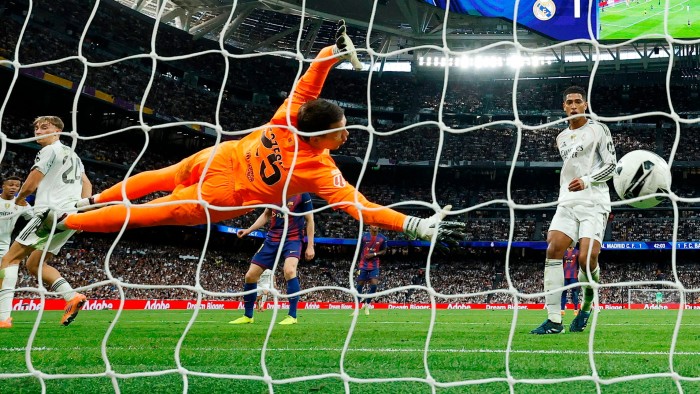Unlock the Editor’s Digest for free
Roula Khalaf, Editor of the FT, selects her favourite stories in this weekly newsletter.
The world’s biggest private equity sports business, CVC-backed Global Sport Group, is searching for new investments after launching last month with a valuation of about €9bn, with assets ranging from Spanish football to rugby and tennis.
Global Sport Group was set up to hold CVC’s sports investments, which include stakes in entities that control the commercial income of Spanish football league LaLiga, France’s Ligue de Football Professionnel and the Women’s Tennis Association.
In his first interview since GSG launched, chair Marc Allera set out the fund’s plans for expansion, as well as a new advisory board of sports stars including South Africa rugby captain Siya Kolisi, Spanish football player David Villa and basketball player Skylar Diggins.
“We want to expand the platform,” he told the Financial Times. “We are looking for other premium leagues watched by hundreds of millions of people, popular in their domestic market, with a management team that recognises that there’s untapped potential.”
GSG’s estimated value is about €9bn, based on an industry multiple of 25-30 times current ebitda of around €300mn — half of which comes from LaLiga, according to a person with knowledge of the matter. Allera declined to comment on the value.
GSG is seen by CVC as a way for it to invest in sports for longer periods and give other investors the chance to increase their exposure to the sector directly rather than through broader funds.
Those working on the firm’s sports strategy are wary of cashing out too early, having watched the value of both F1 and MotoGP soar in the years after selling them.
Allera said GSG would help the different businesses work together in areas such as supplier contracts, negotiations with media partners and access to new markets.
“There are opportunities to . . . help share best practice and use the scale we can bring either on cost or on revenue opportunities like media sponsorship,” he said.
Investors in CVC’s existing funds could be offered the option to buy equity in GSG, according to a person close to CVC, who added that the firm could also seek a debt refinancing of GSG.
Allera declined to comment on this but said the creation of GSG was a “strong signal that the sector is really important and we’re here for the long term”.
He said: “It’s a very attractive business. It’s got diversified revenues. The predictability is high because you do a lot of your media or sponsorship deals years into the future.”
In the longer term, the creation of GSG opens a path to listing or selling some or all of the portfolio. Allera said the fund “could have all sorts of avenues in the future”.
CVC was an early advocate of sport as an asset class uncorrelated with broader markets, a view that is increasingly shared by other institutional investors.
Apollo Global Management, for example, has created a $5bn sports investing vehicle. Some in the industry believe the scarcity of assets — combined with growing investor interest in sport — will support demand when GSG opens to outside capital.
“There’s a lot of interest and a lot of capital chasing sport, but our differentiator is years of knowledge and experience,” Allera said. “If you’re a new sport [intellectual property] holder wanting to accelerate your growth, you can plug into that.”
Allera said sports leagues were more attractive than teams as investments because there was none of the jeopardy of match-day results. “It’s quite nice looking at the results on a Saturday and not worrying about being in the bottom three.”
Sport is attracting vast sums of money from wealthy investors as well as private equity firms, which Allera attributes to the fact that fans prefer to watch sports live rather than on demand via a streaming service.
The success of Netflix’s Drive to Survive, which focuses on individual F1 drivers and team heads, has shown there are different ways to promote brands.
Two of GSG’s directors — George Barrios and Michelle Wilson — are former board members of World Wrestling Entertainment, which has become a multi-platform media business as part of Ari Emanuel’s TKO Group.
“Sport is still on a maturity curve of commercialisation. It’s still got a lot of value that is yet to be untapped,” said Allera.
Not all of CVC’s investments have gone to plan. In France, a spat between the football league and broadcasters has left the league selling live coverage directly to fans.
Allera said that the combination of direct to consumer and broadcast deals was “working really well” now. “It feels like it’s turned the corner.”
Like other European leagues, France has been hit by a fall in the value of broadcasting rights, but Allera said that this was why it was an advantage to have a broader portfolio.
“In having a diversified portfolio of sport assets, you’ve got different situations at different times, and we can afford to take a really long term view. The IP is really valuable.”

